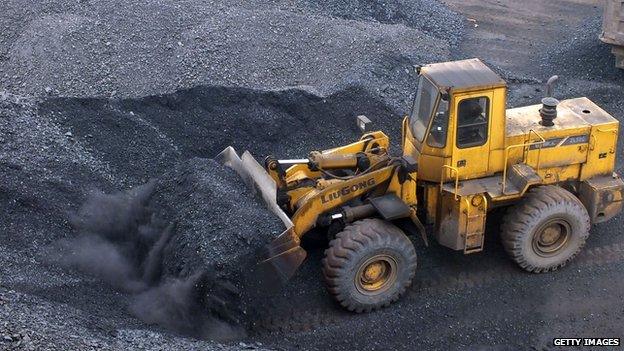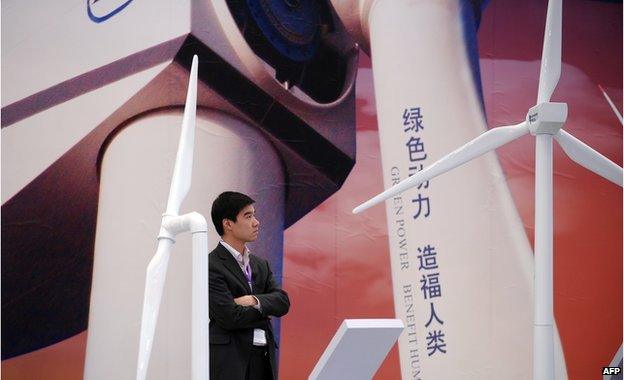China's experts divided over carbon emissions peak
- Published

Xie Zhenhua said China was determined to "peak" in its emissions as soon as possible, but there's no firm date
China's senior climate negotiator says his scientists are divided over when their carbon emissions will peak.
Reports earlier this week suggested that China would introduce an overall emissions cap by 2020.
Speaking on the fringes of UN climate talks in Bonn, Xie Zhenhua said that his country was determined to peak "as soon as possible".
But he said the experts weren't united and it wasn't possible to give a firm date at this point.
President Obama's announcement of a plan to cut carbon from power stations by 2030 was widely praised around the world.
Speaking the next day, the chairman of China's Advisory Committee on Climate Change indicated that the country would limit its emissions for the first time.
Emissions impossible
He Jiankun said that the next five year plan, that would run from 2016, would see an emissions cap and that overall carbon output would peak sometime after 2030.
But Mr He clarified his statements to say that he didn't have the authority to speak on behalf of the government.
The issue of when China's emissions will reach their peak and start to decline is of crucial importance to negotiators here.
Reining in the world's biggest and fastest growing source of CO2, is critical if global temperature increases are to be kept under 2C, the threshold for dangerous impacts according to scientists.

The country has embarked on a rapid expansion of renewable energy
Despite its dizzying speed of development, China has been slow to take on carbon reduction targets.
In 2009, the country's leaders committed China to cutting emissions of carbon relative to economic development. They would reduce the amount of carbon used for growth by 40-45% in 2020, compared to 2005.
To get there, the country has embarked on a rapid expansion of renewable energy and replanting forests, a point made by China's lead negotiator at these talks.
"I am telling you that China is doing its utmost to reduce its carbon intensity but you have to realise that China is in the process of realising modernisation and the total amount of CO2 emissions will be increasing in the future," Mr Xie said, speaking through an interpreter.
He added that China was doing a great deal with renewables, leading the world in installed capacity of wind, solar and bioenergy.
They have already overtaken their targets on planting new forests.
Broad church
However their scientists weren't clear about when total carbon would begin to fall.
"Peaking year is a very complex issue and related closely with economic development, social development and environment issues," Mr Xie said.
"It is a long term issue, and we have mobilised Chinese experts and scientists to try and find an answer on that."
"This process has been going on for more than one year and I can tell you the opinions of the scientists and scholars differ quite a lot."
If China was to set out a goal for emissions to peak it could transform the atmosphere at these negotiations which are showing few signs of a major breakthrough.
"We are working very hard to find a balanced equilibrium between economic development and environmental protection and we hope we can find an answer to that issue as soon as possible."
Mr Xie revealed that he had been personally told of the US move to curb power plant emissions in a phone call from America's special envoy on climate, Todd Stern.
He offered some support for the American move.
"People in the US have quite differing opinions, some people supporting and there are also strong opposition, and the US government by making this decision have overcome many difficulties," the negotiator explained.
Mr Xie said that China would work hard to get agreement on a global climate treaty, agreed by all nations, in Paris in December 2015.
China would be in a position to outline what it will be able to offer as part of that deal, in the first half of next year, he said.
Follow Matt on Twitter, external.